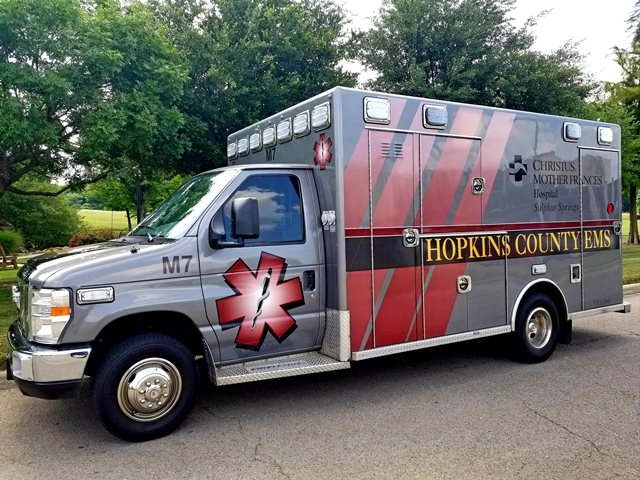PTO Buyback Policy Receives Hospital District Board Approval

Hopkins County Emergency Medical Services personnel could soon expand its coverage into Rains County, making it the third county outside of Hopkins served by the local service.
Hopkins County Hospital District Board of Directors, following an executive session Friday, agreed to the expand Hopkins County EMS services into Rains County, if Rains County Emergency Services District is in agreement, according to HCEMS Services Director Brent Smith and HCHD Board of Directors President Kerry Law.
Rains County ESD will consider accepting a contract with Hopkins County EMS at an upcoming meeting, tentatively set for Aug. 19. If an agreement is reached, HCEMS would begin providing an ambulance in Rains County on Oct. 1.
HCHD Board gave approval to the measure with a goal of benefiting the hospital in this community, through transfers from Rains County to CHRISTUS Mother Frances Hospital-Sulphur Springs, HCHD Board Of Directors President Kerry Law said Friday afternoon following their approval of the expansion.
HC EMS currently serves Franklin and Delta counties and conducts medical transfers for the prison system. The contract would be inline with those inked with Franklin and Delta counties, according to Smith.
Rains County would pay $10,000 a month for ambulance service for Hopkins County EMS, then settle up at the end of the year if anything goes over that amount.
Rains County has a modern station constructed in 2013 in Emory with fund provided by that community’s Economic Development group. Champion EMS, which is part of the CHRISTUS system, currently operates ambulances at the station. If HCEMS is given the contact, they would provide an ambulance and crew who would be work out of the Emory station.
If the contract is approved later this month by Rains County EDS, Hopkins County EMS then need to hire six additional paramedics to staff the Rains County ambulance starting Oct. 1, according to Smith.
Smith said there are a few details to work out; discussion regarding the expansion is ongoing
PTO Buyback Policy
A personal time off “buy back” policy adopted by HCHD Board during Friday’s meeting could be an added benefit that could factor into recruitment and retention of ambulance staff employed by HCEMS, according to Smith.
The hospital district board agreed to the policy, allowing employees to “sell” unused vacation time back. EMS staff are currently required to take one week of personal time off or PTO. For an employee who works a 24-hour shift, that’d be 72 hours. Each employee earns a certain amount of PTO based on their hours and years worked. They also must maintain 72 hours or 3 days of time in their account, and under the proposal would only be able to sell unused time back once a year.
Smith told the hospital board that he has several long-time employees who never come close to using up their PTO time for vacation, and while they could would likely never cash in all of the time accrued. Then there are others, often younger staff, who take their time off as soon as they’ve earned it.
This is a tool many other EMS services use to retain and recruit staff, Smith said he learned at a recent Texas EMS Alliance conference.
“We want to recruit and keep paramedics. There’s a paramedic shortage out there. If you want to recruit, you have to use PTO if you want to try to add another benefit to the package to offer,” Smith told HCHD Board at Friday’s noon meeting.
As an example of how this could be useful to an employee, they could potentially sell back unused PTO to help pay for expense of say a costly and unanticipated necessary repair such as a new or rebuilt transmission for their personal vehicle vehicle.
Board member Joe Bob Burgin noted he did not like the policy which without a cap would allow an employee to cash in 600 hours at a time. He also pointed out that for many employees, only being able to cash in their unused PTO once a year would limit them in being able to use the funding in event of an emergency.
The policy as proposed was approved by the board, with one amendment. The time, for those who have it and still have the required time in their account, can be cashed in quarterly instead of just once a year.







